See
False promises, real harm: Why Illinoisans should reject a progressive income tax.By By Orphe Divounguy, Bryce Hill and Joe Tabor of Illinois Policy. Excerpts:
"With
Illinoisans already shouldering a record $5 billion income tax hike
passed in 2017 – which still could not keep up with Springfield’s
spending demands – many state lawmakers are trying to justify further
tax hikes without drawing the ire of the voting public.
How? By calling for a progressive
income tax. Some members of the Illinois General Assembly, as well as
many Democratic gubernatorial candidates, have been pushing the idea of
scrapping Illinois’ constitutionally protected flat income tax in favor
of a progressive income tax that would make “the rich” pay their “fair
share.”
Proponents of scrapping this
constitutional protection make three key claims regarding a progressive
income tax: it would reduce taxes on the middle class, it would go a
long way toward reducing income inequality and it would benefit the
state’s economy.
An evaluation of current
progressive tax proposals in the Illinois General Assembly, economic
literature on progressive income taxes and outcomes in all 50 states
reveal these claims are misleading at best.
First, states with progressive income taxes have seen slower economic growth and faster growth in inequality.
Second, most economists agree that more progressive tax structures reduce economic growth.
And finally, Illinois’ spending
problems dictate that a progressive tax would entail large tax hikes on
the middle class, leading to severe economic damage. A leading
progressive tax proposal in the Illinois General Assembly – House Bill
3522 – would hike income taxes for a vast majority of Illinoisans.
Economic modeling estimates that if this proposal had been enacted in
2016, it would have cost Illinoisans 34,500 jobs and cost the state
economy $5.5 billion in the first year after enacted, erasing nearly 75
percent of the employment growth Illinois saw in 2017.
This potential economic harm is the
most important reason Illinoisans should not allow a progressive income
tax. It would likely lead to tax hikes on the middle class, fewer job
prospects and lower incomes.
In short, a progressive tax is not the solution Illinoisans need to turn their state around.
Instead, lawmakers must look to
rein in the growth in state spending, which outpaced personal income
growth by 25 percent from 2005-2015. This lack of discipline has forced
tax hikes, unsustainable debt and enormous uncertainty in the private
sector over the future of Illinois. Rather than introducing more
uncertainty with a progressive income tax system, lawmakers should adopt
a spending cap that ties state spending growth to growth in Illinois’
economy. Illinoisans can then rest assured they’re getting a state
government they can afford."
"Advocates of a progressive income tax at the state level make three key claims, all of which are misleading to varying degrees:
- A progressive income tax would reduce taxes on the middle class.
- A progressive income tax would go a long way toward reducing income inequality.
- A progressive income tax could actually benefit the state’s economy.
On the opposite side of the debate are those who believe the income
tax rate should remain flat, as it is currently in Illinois. Proponents
of the flat tax system pose three main arguments:
- A flat tax system is fairer because all taxpayers pay the same tax rate.
- Wealthier Illinoisans already pay the bulk of all income taxes collected in the state.
- A progressive income tax will do little to improve income equality while harming economic outcomes for all.
Since the publication of the seminal work of Hall and Rabushka (1995)1,
academics have been arguing in favor of a simplification of the tax
code, a broadening of the tax base and a reduction of marginal taxes.
Progressive taxation does the opposite: it makes the tax code more
complex and can have disastrous effects on economic growth."
"According to the U.S. Census Bureau’s American Community Survey, the
five states in 2006 with the lowest Gini coefficients – meaning the
lowest levels of income inequality – were Utah, Wyoming, Alaska, New
Hampshire and Vermont. Only Vermont had a progressive income tax. In
2016, Alaska, Utah, New Hampshire, Wyoming and Hawaii had the lowest
Gini coefficients. Only Hawaii has a progressive income tax.
By 2016, Vermont was more unequal, falling to 17th place from 5th
place based on the Gini coefficient. Hawaii moved up the rankings to 5th
place from 18th place between 2006 and 2016. Hawaii’s rise in the
rankings was only due to rising inequality across the U.S.
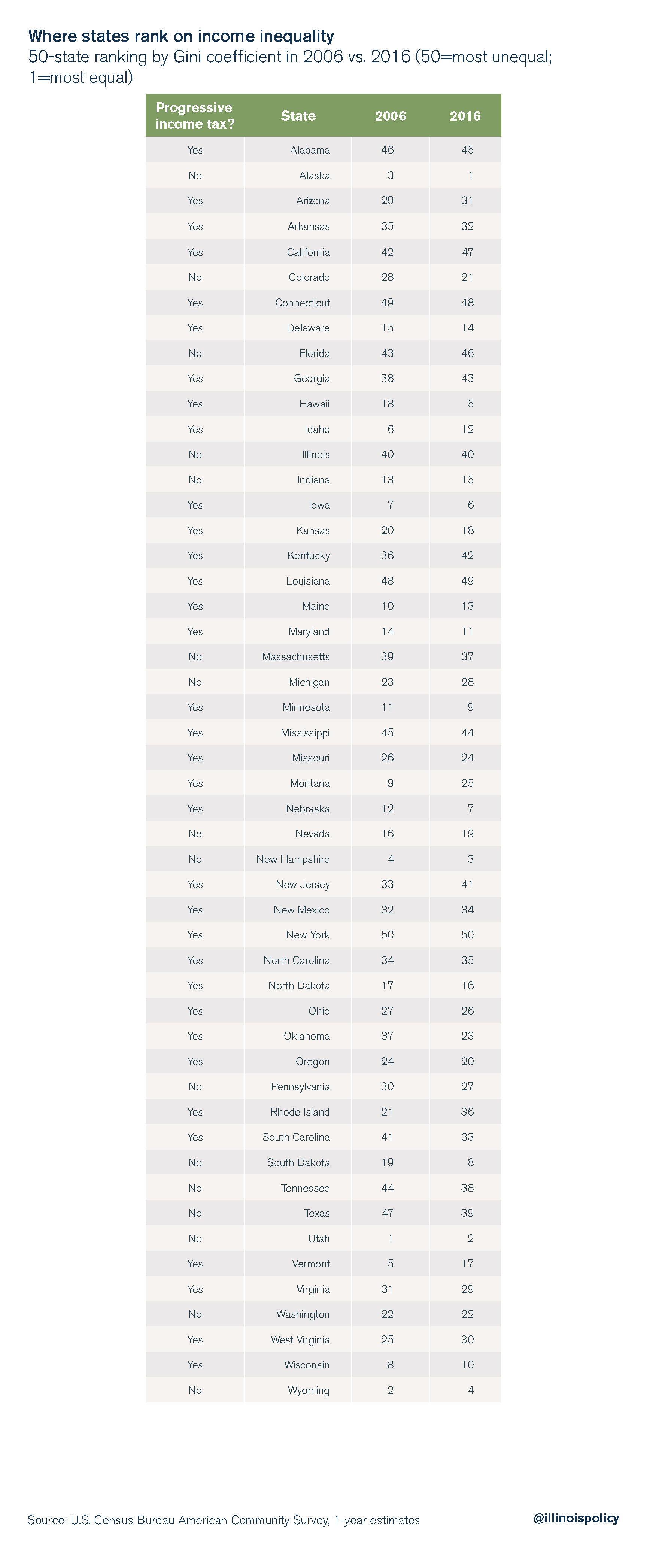
While changes in inequality reflect a host of factors, it is
certainly not the case that states with a progressive income tax are
more equal. In 2016, the average Gini coefficient in states with a
progressive tax was 2.8 percent higher than states without a progressive
income tax.
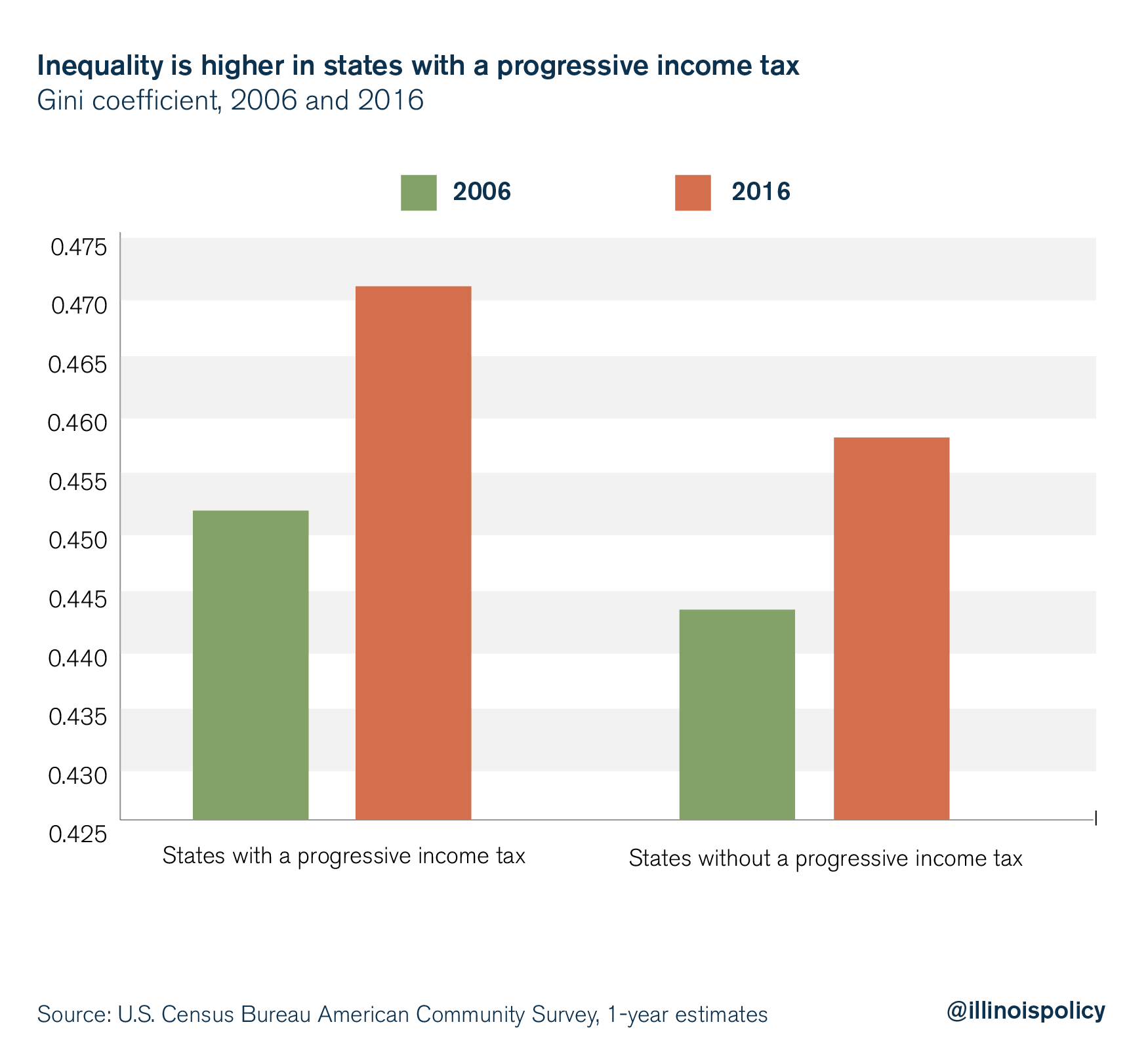
Not only is inequality higher in states with a progressive income
tax, but inequality has risen faster in those states as well. Inequality
in states with a progressive income tax grew 4.2 percent from 2006 to
2016, while inequality grew by 3.3 percent in states without a
progressive income tax.

Would a progressive income tax reduce inequality in Illinois?
Economists remain divided as to whether tax progressivity reduces
inequality or has any effect on inequality whatsoever (see Appendix A).
"most economists agree that more progressive tax structures
reduce economic growth. And the data point to the same conclusion:
States without a progressive income tax have performed better than
states with a progressive income tax.
Examining the past decade of the most recently available
macroeconomic data reveals overall economic activity – measured as real
gross state product, or GSP – has grown faster in states without a
progressive income tax than in states with a progressive income tax.
Since 2006, states without a progressive income tax have seen GSP grow
by 14.7 percent, while states with a progressive income tax have seen
10.8 percent GSP growth.
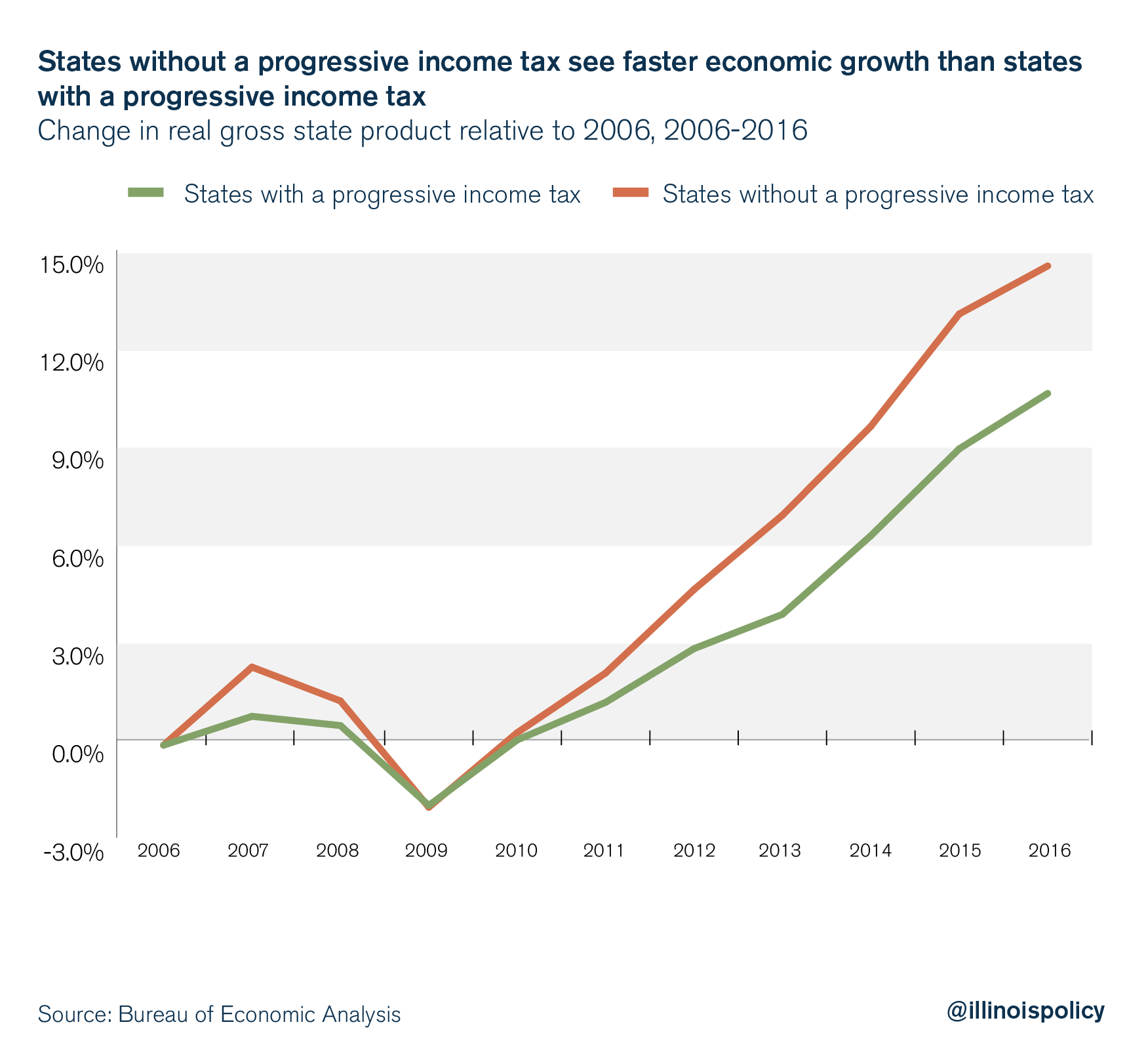
Additionally, employment has increased faster in states without
progressive income taxes. In states without a progressive income tax,
nonfarm payrolls have increased 7.8 percent, while payrolls have only
increased 5.1 percent in states with a progressive income tax, since
2006.
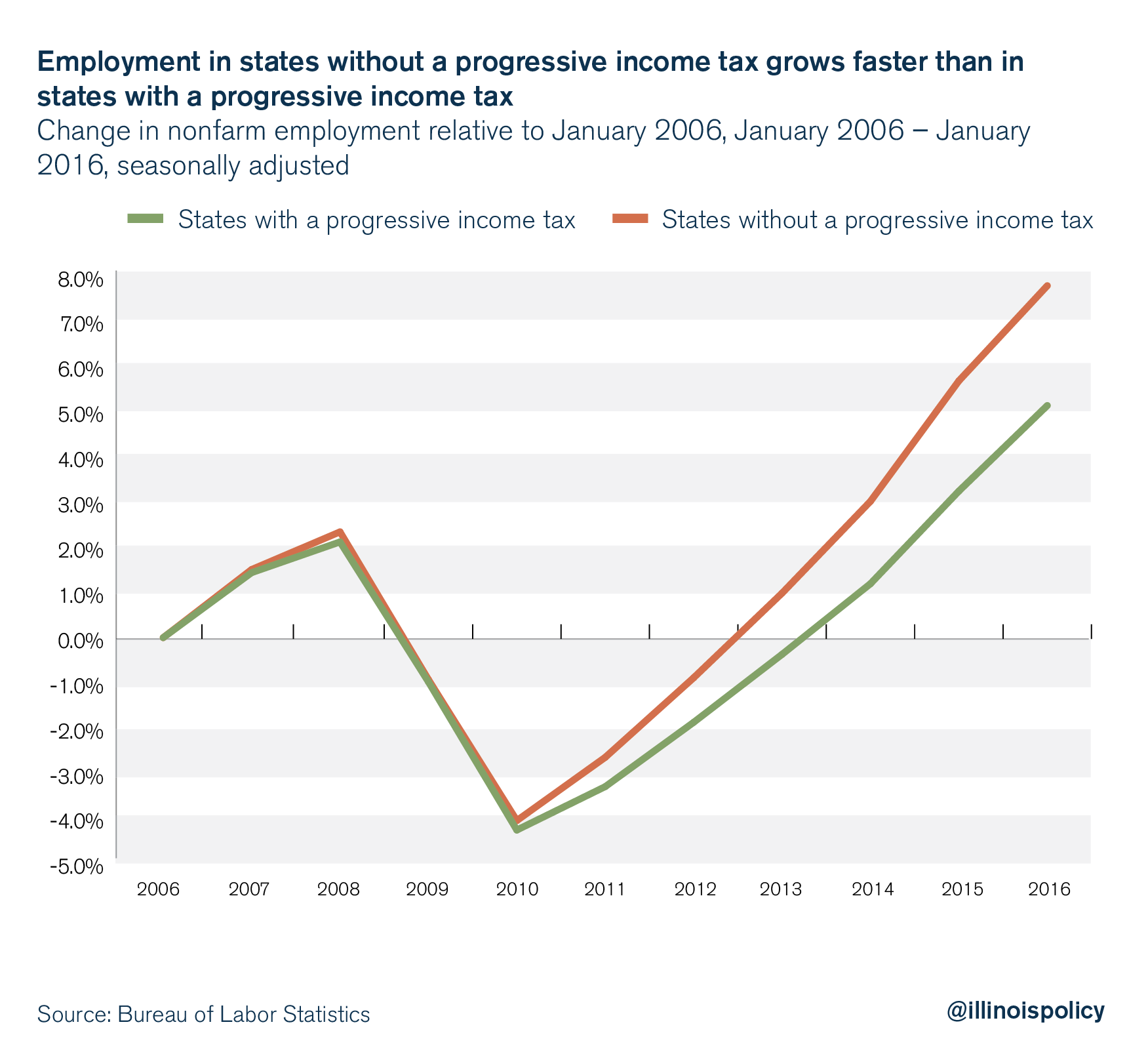
Wages and salaries have also been growing faster in states without a
progressive income tax. Since 2006, states without a progressive income
tax have seen wages and salaries increase 15.3 percent. Meanwhile, in
states with a progressive income tax, wages and salaries have only
increased 12.6 percent.
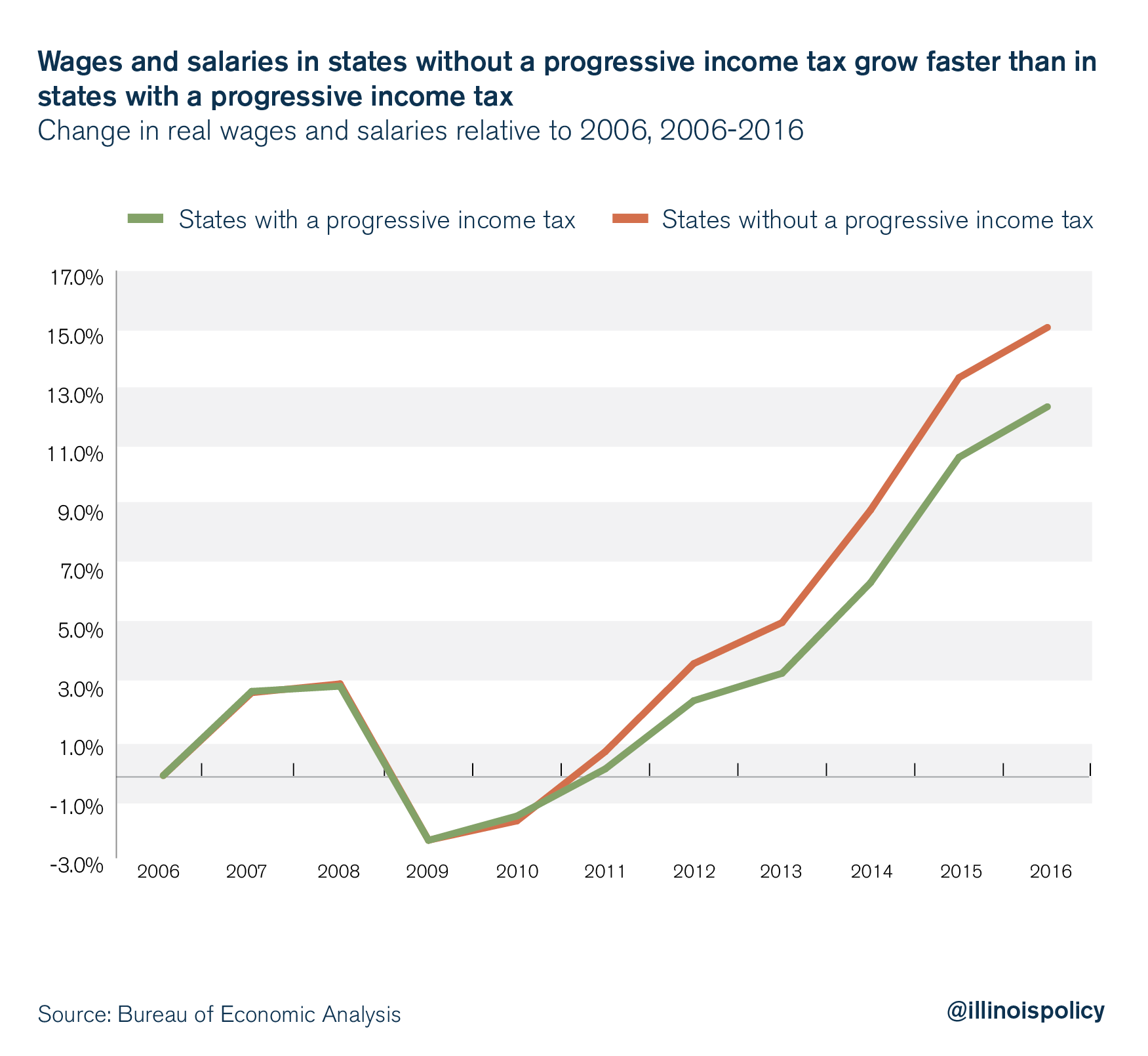
A majority of economists seem to agree that under plausible
assumptions, tax progressivity has had a negative impact on the U.S.
economy (see Appendix B)."
"Measuring the effects of tax changes on the economy is a challenging
task. Fortunately, there’s a large body of expert literature that
addresses difficult empirical challenges and that proposes economic
theories that are consistent with the data. Romer and Romer (2010) find that tax increases have a negative impact on real gross domestic product.2 This
is because tax increases have a large and sustained negative impact on
investment. These results are consistent with the findings of Blanchard
and Perotti (2002)3 and Mountford and Uhlig (2009).4"






No comments:
Post a Comment
Note: Only a member of this blog may post a comment.